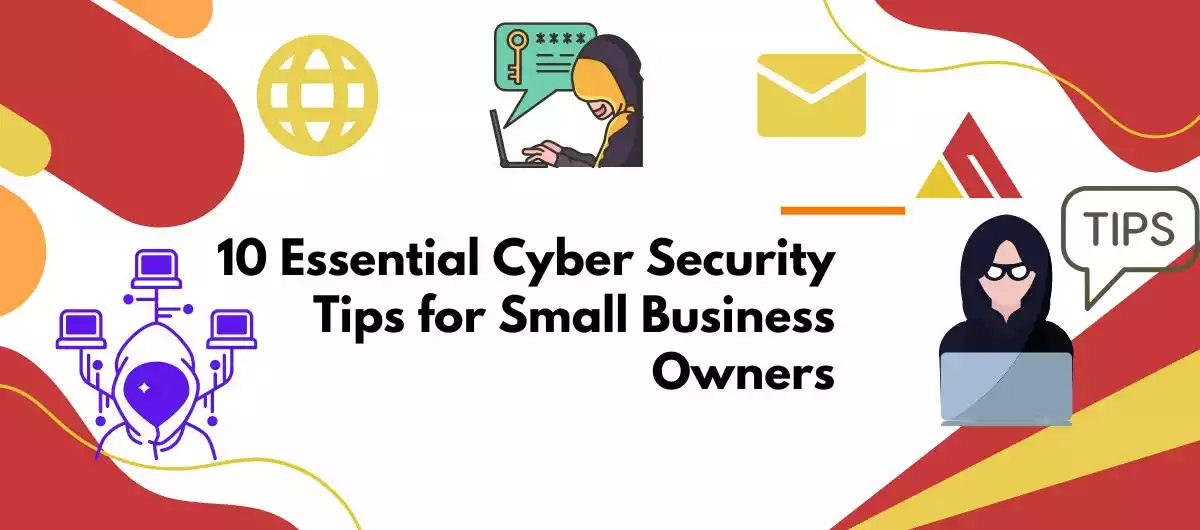Contents
- 1 10 Essential Cyber Security Tips for Small Business
- 1.1 1. Use Strong Passwords and Two-Factor Authentication
- 1.2 2. Keep Your Software Up-to-Date
- 1.3 3. Use Antivirus and Anti-Malware Software
- 1.4 4. Regularly Back-Up Your Data
- 1.5 5. Be Careful of Phishing email Attachments
- 1.6 6. Limit Access to Sensitive Information
- 1.7 7. Use Secure Connections
- 1.8 8. Train Your Employees
- 1.9 9. Conduct Regular Security Audits
- 1.10 10. Work With a Cyber Security Experts
- 1.11 Conclusion
- 1.12 FAQs: 10 Essential Cyber Security Tips for Small Business Owners
10 Essential Cyber Security Tips for Small Business
As a small business owner, you should keep your digital assets secure, it should be a crucial part of your business strategy. With an increasing number of business operations shifting to online operations, cyber security threats to companies particularly small business houses are becoming more common and sophisticated. The consequences of a data breach can be devastating for your business as well as to your clients, so it’s important to take proactive measures to protect your business from unprotected cyber attacks in the future.
I am going to explain here the top 10 Essential Cyber Security Tips for Small Business Owners to help your business from cyber breach :
1. Use Strong Passwords and Two-Factor Authentication
One of the easiest ways for hackers to gain access to your systems is by cracking weak passwords. Make sure that all of your passwords are strong, containing a mix of upper and lower case letters, numbers, and symbols. It’s also a good idea to use two-factor authentication (2FA) whenever possible, which will add an extra layer of security to your accounts.
2. Keep Your Software Up-to-Date
Hackers are constantly searching for vulnerabilities in software that they can be exploited. Software developers are aware of these new threats, so they release updates to their products to address those vulnerabilities from time to time. By keeping your software up-to-date, you can reduce the chances of falling victim to a cyber attack.
3. Use Antivirus and Anti-Malware Software
Antivirus and anti-malware software can help prevent and detect malicious activity on your computer systems. It’s important to regularly update these tools, so that they can detect the latest threats. Additionally, ensure the regular scan of your computer systems to detect any malware that might have made it through your other security measures.
4. Regularly Back-Up Your Data
Data breaches can result in the loss of important information about your business, such as customer data, financial records, and other data. By regularly backing up your data, you can quickly restore your systems in the event of a cyber breach. You should consider using both local and cloud-based backup solutions for foolproof security of backed-up data.
5. Be Careful of Phishing email Attachments
Phishing emails are a common way for hackers to gain access to your systems. These emails often contain attachments or links that can download malware onto your computer. By way of phishing emails, attackers can steal your personal or sensitive information.
6. Limit Access to Sensitive Information
Not all employees need access to sensitive information, such as financial records or customer data. By imposing an access control mechanism, you can reduce the possibility of falling the data into the wrong hands. Make sure that you have strict access control policies in place, and regularly review the role assignment to access the sensitive information of your business.
7. Use Secure Connections
The use of secure connections while transmitting sensitive information over the internet is very important to prevent data breaches in transit. You should always use encrypted websites and virtual private networks (VPNs) when accessing sensitive information from remote locations.
8. Train Your Employees
Your employees are often the first line of defence against cyber attacks. Regular training and education of employees can ensure the timely detection and response to potential threats in future. You may consider training topics such as training on how to identify phishing emails, use secure passwords, and other important security measures.
9. Conduct Regular Security Audits
You should consider undertaking regular security audits of your IT systems and networks of your business that can help you to identify any vulnerabilities and make you take necessary actions to secure them. These audits should include a review of your software, hardware, and employee practices. There are certain Microsoft sysinternal tools for the security audit of the Windows systems.
10. Work With a Cyber Security Experts
Working with cyber security experts can help you to ensure that your systems are secure and that you are taking the right steps to protect your business from cyber-attacks. They can provide expert advice, conduct security audits, and help you respond to a breach if one occurs.
Conclusion
By following these 10 Cyber Security Tips for Small Business Owners and FAQs (given below), you can take proactive measures to protect your small business from cyber security threats and can reduce the chances of falling victim to a future cyber security breach.
It’s important to remember that cyber security is an ongoing process, and you should regularly review and update your security measures to stay ahead of the latest threats. As technology evolves and new threats emerge, it’s important to stay informed and up-to-date on the latest security measures and best practices.
FAQs: 10 Essential Cyber Security Tips for Small Business Owners

Frequently Asked Questions (FAQs) for jargon used in the Article :
1. What is cyber security?
Answer: Cyber security refers to the protection of digital assets, such as computers, networks, and data, from unauthorized access, use, disclosure, disruption, modification, or destruction of data.
2. What is a phishing email?
Answer: A phishing email is a fraudulent message that is designed to trick you into revealing sensitive information, such as passwords or financial information. Phishing emails often contain attachments or links if clicked can download malware onto your computer.
3. What is a virtual private network (VPN)?
Answer: A virtual private network (VPN) is a secure connection that allows you to access the internet from a remote location as if you were on a local network. This can be useful for accessing sensitive information from remote locations, as it helps protect your information from being intercepted by third parties.
4. What is a security audit?
Answer: A security audit is a comprehensive review of your systems and processes using special cybersecurity tools to identify any vulnerabilities or weaknesses. This can include a review of your software, hardware, and employee practices, and can help you identify areas where you can improve your security measures.
5. Why is cyber security important for small businesses?
Answer: Small businesses are often targets of cyber attacks due to their perceived lack of security measures. Protecting against these threats is essential to prevent financial loss, protect customer data, and maintain the reputation of the business.
6. What are some common cyber security threats facing small businesses?
Answer: Some common threats facing small businesses include phishing attacks, ransomware, malware, and network intrusions.
7. How can small business owners protect against cyber security threats?
Answer: Small business owners can protect against cyber security threats by implementing strong passwords, regularly updating software, regularly backing up data, and staying informed on the latest threats and best practices.
8. Is it necessary to hire a professional for cyber security protection?
Answer: While it is possible for small business owners to implement basic security measures on their own, hiring a professional for comprehensive cybersecurity protection may be necessary for businesses that handle sensitive information or have complex network systems.
9. What is two-factor authentication and why is it important?
Answer: Two-factor authentication (2FA) adds an extra layer of security to your accounts by requiring a second factor, such as a one-time code sent to your phone, in addition to your password. This makes it more difficult for hackers to gain access to your accounts, even if they have your password.
10. What is the difference between antivirus and anti-malware software?
Answer: Antivirus software is designed to detect and prevent the spread of viruses, whereas anti-malware software is designed to detect and remove malware, including viruses, spyware, and other malicious software. Both types of software are important for keeping your systems secure.
Also Read: Preventing Cyber Attacks And How To Protect Yourself: Complete Guide

